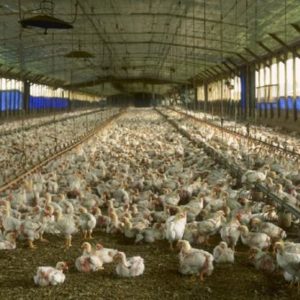Photo: Wikimedia Commons. A commercial meat chicken production house in Florida.
You probably already know that McDonald’s is responsible for a whole host of abuses when it comes to marketing to kids and destroying people’s health. But did you know that the corporation is polluting our waterways as well?
Our friends at Environment America are exposing the corporations pouring the most toxic waste into rivers, lakes, and coastlines across the U.S. In a report earlier this year, Environment America named the fifteen worst corporate water-polluters. At Corporate Accountability International, we organize with people around the world to protect the human right to water from corporate profiteers, whether in the form of bottling in the midst of a drought or so-called “public-private partnerships.” Environment America’s report reveals yet another way corporations contribute to the global water crisis: by polluting waterways and leaving the public to foot the bill.
The report uses the Environmental Protection Agency’s Toxic Release Inventory (TRI) to identify the corporations pumping the most pollution into U.S. rivers, lakes, and coastlines. Tyson, Cargill, and Pilgrim’s Pride, which all rank in the top fifteen, have something else in common: They are all McDonald’s suppliers. Together, they released 181 million pounds of pollution, including nutrients, bacteria, sediments, and pesticides, into surface waters between 2010 and 2014.
Tyson: creating dead zones and threatening drinking water
Environment America’s report, the latest in its series on corporate water pollution, zeroes in on Tyson, which it names as “one of the world’s largest producers of meat and poultry.” Tyson’s method of bringing meat to market produces huge amounts of pollution, including manure runoff from contract growers’ factory farms, fertilizer runoff from fields where chicken feed is grown, and waste from Tyson’s processing plants. Between 2010 and 2014, Tyson released 104 million pounds of waste into U.S. waterways, not including manure from billions of animals raised and slaughtered by the company each year. Tyson claims to slaughter an average of 41 million chickens, 133,000 cows, and 383,000 hogs per week.
One of the many devastating impacts of Tyson’s practices is nitrate pollution. Nitrates can contribute to algal blooms, which in turn can cause dead zones — areas in oceans and lakes where the decay of algae depletes the dissolved oxygen in the water column, so that it can no longer sustain most marine life. Furthermore, nitrates, when highly concentrated in drinking water, can cause “blue baby” syndrome, a potentially fatal disorder in which there is a reduction in the oxygen-carrying capacity of the blood. Nitrate contamination of drinking water is forcing some municipalities to take on costly clean-up efforts to keep water safe. For example, a report on Minnesota’s drinking water found that across the state, water systems were forced into costly measures to prevent and reverse nitrate pollution, and the governor says that stronger laws regulating pollution from industrial agriculture are urgently needed.
Industrial agriculture: an unsustainable model
“Farming is not an inherently polluting activity,” Environment America points out. It is the practices of industrial agriculture that endanger our planet and our health.
For example, planting miles and miles of a monoculture depletes the soil of nutrients and renders plants vulnerable to pests, compelling the heavy use of fertilizers and pesticides. Corporations raising animals for meat often employ concentrated animal feeding operations (CAFOs), where hundreds or thousands of animals are held on small feedlots and fed commodity grain. Manure from CAFOs is stored in “lagoons,” or else liquefied and sprayed across farm fields, often in quantities too great for the land to absorb. Runoff from CAFOs winds up in the water, bringing nitrates, phosphates, and dangerous bacteria with it.
The Union of Concerned Scientists estimates that more than fifty percent of animal foods consumed in the U.S. were produced by CAFOs.
As a result of these polluting practices, over 100,000 miles of our rivers and 2,500 square miles of our inland lakes are now unsafe for swimming, fishing, and drinking, and can no longer support healthy ecosystems. Industrial agriculture is feeding billowing dead zones in the Chesapeake Bay, the Gulf of Mexico, Lake Erie, and elsewhere.
The classic defense of industrial agriculture is that it feeds the world “cheaply.” But look more closely and you’ll see it is not cheap at all. Those of you supporting and following our Value [the] Meal campaign know that eating “cheap” fast food, like McDonald’s products, can have devastating health effects and rack up billions in health care costs. And then there’s the unlivable wages for food workers and torturous living conditions for animals: all consequences of our “cheap” but broken food system.
And let’s not forget that the corporate abuse of our food also undermines people’s access to water. Part of what makes industrial food so “cheap” is that corporations do not pay to repair the damage they cause to the environment, including our precious water resources.
A corporate-driven world water crisis
At Corporate Accountability International, we expose and challenge the corporations exacerbating and profiting from the global water crisis. Private water corporations have eroded people’s confidence in public water and thereby discouraged vital public investments in infrastructure. Federal spending on public water in the U.S. has declined, and when municipalities find that they cannot alone afford the infrastructure improvements they need, water corporations are eager step in, take over control, and run the systems — not to help meet people’s need for water but to grow their corporate coffers.
Looking at McDonald’s suppliers’ role in polluting our waterways, we see the other side of the coin. Not only are transnational corporations eroding our confidence in public drinking water, they are also increasing the cost to the public of providing clean water to all.







